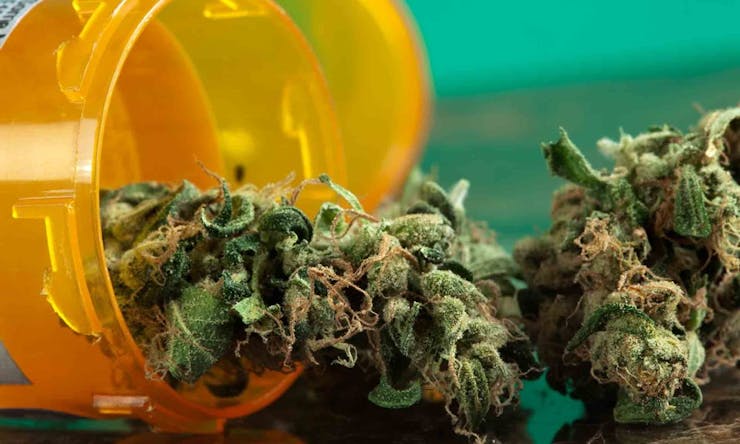I started my morning by reading the following statement from DEA chief Chuck Rosenberg:
“What really bothers me is the notion that marijuana is also medicinal — because it’s not. We can have an intellectually honest debate about whether we should legalize something that is bad and dangerous, but don’t call it medicine — that is a joke.”
As someone who has been profoundly affected by medical marijuana, it’s difficult for me to tame my emotions when someone calls this medicine “a joke.” And what really brings my blood to a boil is knowing how many other people – patients treating cancer, pain, nausea, PTSD, MS, seizures, arthritis, HIV/AIDS – are fighting an uphill legal battle just to feel better.
Rosenberg added:
“’There are pieces of marijuana — extracts or constituents or component parts — that have great promise,’ he continued. But if you talk about smoking the leaf of marijuana — which is what people are talking about when they talk about medicinal marijuana — it has never been shown to be safe or effective as a medicine.”
So should we have that “intellectually honest debate” now, Chuck? I’ll even set aside my emotions aside, resist flipping this table over, and let science do the talking. Here are five studies that show the medical utility of the cannabis “leaf.”
1. Raw Cannabis Effectively Curbs Nausea
A 2001 study compared the effects of smoked cannabis and a synthetic THC pill in over 700 patients. They found that those inhaling cannabis reported higher relief ratings than those taking the synthetic THC pill, leading researchers to conclude that “smoked marijuana can be a very successful treatment for nausea and vomiting following cancer chemotherapy.”
As one HIV/AIDS patient put it, “The [synthetic THC] pills I took for episodes of nausea didn’t stay in my stomach for more than five minutes.”
“Not infrequently, a single [synthetic THC] capsule would make me feel ‘stoned’ for several hours, such that I was unable to function at a level at which I felt comfortable or competent… I found that it took only two or three puffs from a marijuana cigarette for my appetite to return. Moreover, the beneficial effect took place within minutes rather than hours that I sometimes waited after swallowing a Marinol capsule.”
2. Inhaled Cannabis Improves Pain
Researchers in this 2010 study had subjects smoke cannabis three times daily and measured its efficacy in treating neuropathic pain. Not only did subjects notice a significant decrease in pain, most also saw improvements in mood and sleep. These findings were echoed in several other studies evaluating the efficacy of inhaled cannabis, including this 2009 study on HIV-related pain, and this 2012 study on vaporized cannabis and pain, and this neuropathy study from 2007.
3. Smoked Cannabis Helps Ease MS Symptoms
In 2012, a study on multiple sclerosis (MS) showed that inhaled cannabis reduced spasticity and pain compared to a placebo group. These results reinforced an older study that found 70 percent of subjects experienced improvements in spasticity, tremors, pain, and depression after using medical cannabis. Even the American Academy of Neurology admitted that medical marijuana could be the most effective alternative or complementary medicine for patients with MS.
4. Inhaling Cannabis Led to Reduced Insomnia
In a retroactive analysis of data, this 2011 review found that 79 percent of PTSD subjects had an easier time falling asleep after inhaling cannabis. Not only that, 21 percent noted a decrease in dream occurrence which could be helpful in those suffering nightmares. Researchers also commented that cannabis would offer patients with insomnia a safer solution than benzos like Xanax and Ambien.
5. Cannabis Inhalation Helps Gastrointestinal Symptoms
In a 2012 study of patients suffering from inflammatory bowel disease (IBD), subjects reported improvements in general health perception, social functioning, ability to work, physical pain, and depression. It also promoted weight gain in long-standing IBD patients who had previously experienced appetite loss.
Though a small study, what we see in this research is anecdotally confirmed by many patient accounts. In Lester Grinspoon’s book Marihuana, the Forbidden Medicine, a patient with Crohn’s writes, “[Cannabis] has fewer side effects than all the other drugs and provides the best relief for my symptoms; it also helps me maintain a perspective on the illness and on my life.”
As you can see, Mr. Rosenberg, inhaled cannabis is medicine, and it’s your damn prohibition that’s preventing patients from accessing these refined constituents you believe to be so much more superior. You said it yourself: cannabis constituents are medicinal, and unless you start helping open doors to these smoke-free derivatives, you can bet your ass we’re going to keep smoking this “joke” of a medicine so long as it’s helping us live happier and healthier lives.





